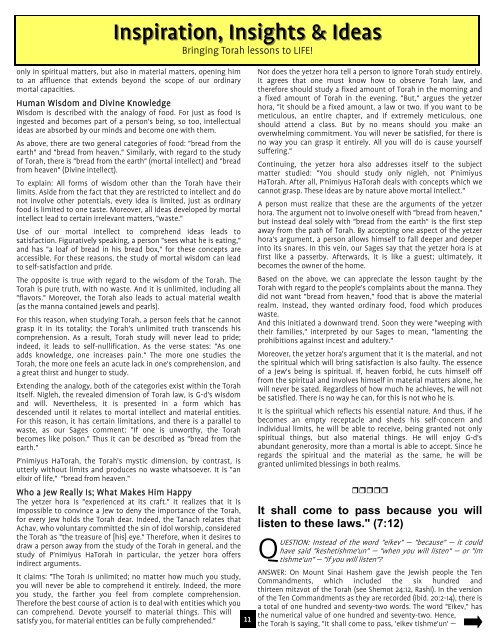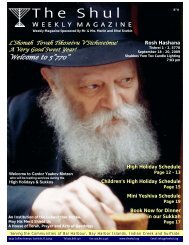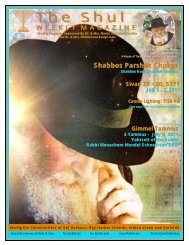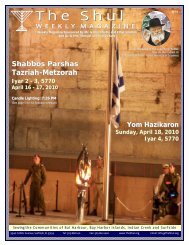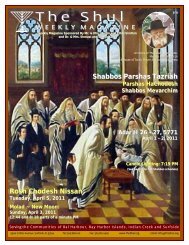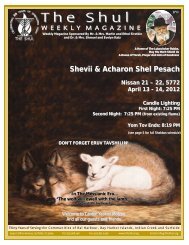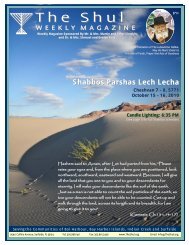Create successful ePaper yourself
Turn your PDF publications into a flip-book with our unique Google optimized e-Paper software.
Inspiration, Insights & Ideas<br />
Bringing Torah lessons to LIFE!<br />
only in spiritual matters, but also in material matters, opening him<br />
to an affluence that extends beyond the scope of our ordinary<br />
mortal capacities.<br />
Human Wisdom and Divine Knowledge<br />
Wisdom is described with the analogy of food. For just as food is<br />
ingested and becomes part of a person's being, so too, intellectual<br />
ideas are absorbed by our minds and become one with them.<br />
As above, there are two general categories of food: "bread from the<br />
earth" and "bread from heaven." Similarly, with regard to the study<br />
of Torah, there is "bread from the earth" (mortal intellect) and "bread<br />
from heaven" (Divine intellect).<br />
To explain: All forms of wisdom other than the Torah have their<br />
limits. Aside from the fact that they are restricted to intellect and do<br />
not involve other potentials, every idea is limited, just as ordinary<br />
food is limited to one taste. Moreover, all ideas developed by mortal<br />
intellect lead to certain irrelevant matters, "waste."<br />
Use of our mortal intellect to comprehend ideas leads to<br />
satisfaction. Figuratively speaking, a person "sees what he is eating,"<br />
and has "a loaf of bread in his bread box," for these concepts are<br />
accessible. For these reasons, the study of mortal wisdom can lead<br />
to self-satisfaction and pride.<br />
The opposite is true with regard to the wisdom of the Torah. The<br />
Torah is pure truth, with no waste. And it is unlimited, including all<br />
"flavors." Moreover, the Torah also leads to actual material wealth<br />
(as the manna contained jewels and pearls).<br />
For this reason, when studying Torah, a person feels that he cannot<br />
grasp it in its totality; the Torah's unlimited truth transcends his<br />
comprehension. As a result, Torah study will never lead to pride;<br />
indeed, it leads to self-nullification. As the verse states: "As one<br />
adds knowledge, one increases pain." The more one studies the<br />
Torah, the more one feels an acute lack in one's comprehension, and<br />
a great thirst and hunger to study.<br />
Extending the analogy, both of the categories exist within the Torah<br />
itself. Nigleh, the revealed dimension of Torah law, is G-d's wisdom<br />
and will. Nevertheless, it is presented in a form which has<br />
descended until it relates to mortal intellect and material entities.<br />
For this reason, it has certain limitations, and there is a parallel to<br />
waste, as our Sages comment: "If one is unworthy, the Torah<br />
becomes like poison." Thus it can be described as "bread from the<br />
earth."<br />
P'nimiyus HaTorah, the Torah's mystic dimension, by contrast, is<br />
utterly without limits and produces no waste whatsoever. It is "an<br />
elixir of life," "bread from heaven."<br />
Who a Jew Really Is; What Makes Him Happy<br />
The yetzer hora is "experienced at its craft." It realizes that it is<br />
impossible to convince a Jew to deny the importance of the Torah,<br />
for every Jew holds the Torah dear. Indeed, the Tanach relates that<br />
Achav, who voluntary committed the sin of idol worship, considered<br />
the Torah as "the treasure of [his] eye." Therefore, when it desires to<br />
draw a person away from the study of the Torah in general, and the<br />
study of P'nimiyus HaTorah in particular, the yetzer hora offers<br />
indirect arguments.<br />
It claims: "The Torah is unlimited; no matter how much you study,<br />
you will never be able to comprehend it entirely. Indeed, the more<br />
you study, the farther you feel from complete comprehension.<br />
Therefore the best course of action is to deal with entities which you<br />
can comprehend. Devote yourself to material things. This will<br />
satisfy you, for material entities can be fully comprehended."<br />
11<br />
Nor does the yetzer hora tell a person to ignore Torah study entirely.<br />
It agrees that one must know how to observe Torah law, and<br />
therefore should study a fixed amount of Torah in the morning and<br />
a fixed amount of Torah in the evening. "But," argues the yetzer<br />
hora, "it should be a fixed amount, a law or two. If you want to be<br />
meticulous, an entire chapter, and if extremely meticulous, one<br />
should attend a class. But by no means should you make an<br />
overwhelming commitment. You will never be satisfied, for there is<br />
no way you can grasp it entirely. All you will do is cause yourself<br />
suffering."<br />
Continuing, the yetzer hora also addresses itself to the subject<br />
matter studied: "You should study only nigleh, not P'nimiyus<br />
HaTorah. After all, P'nimiyus HaTorah deals with concepts which we<br />
cannot grasp. These ideas are by nature above mortal intellect."<br />
A person must realize that these are the arguments of the yetzer<br />
hora. The argument not to involve oneself with "bread from heaven,"<br />
but instead deal solely with "bread from the earth" is the first step<br />
away from the path of Torah. By accepting one aspect of the yetzer<br />
hora's argument, a person allows himself to fall deeper and deeper<br />
into its snares. In this vein, our Sages say that the yetzer hora is at<br />
first like a passerby. Afterwards, it is like a guest; ultimately, it<br />
becomes the owner of the home.<br />
Based on the above, we can appreciate the lesson taught by the<br />
Torah with regard to the people's complaints about the manna. They<br />
did not want "bread from heaven," food that is above the material<br />
realm. Instead, they wanted ordinary food, food which produces<br />
waste.<br />
And this initiated a downward trend. Soon they were "weeping with<br />
their families," interpreted by our Sages to mean, "lamenting the<br />
prohibitions against incest and adultery."<br />
Moreover, the yetzer hora's argument that it is the material, and not<br />
the spiritual which will bring satisfaction is also faulty. The essence<br />
of a Jew's being is spiritual. If, heaven forbid, he cuts himself off<br />
from the spiritual and involves himself in material matters alone, he<br />
will never be sated. Regardless of how much he achieves, he will not<br />
be satisfied. There is no way he can, for this is not who he is.<br />
It is the spiritual which reflects his essential nature. And thus, if he<br />
becomes an empty receptacle and sheds his self-concern and<br />
individual limits, he will be able to receive, being granted not only<br />
spiritual things, but also material things. He will enjoy G-d's<br />
abundant generosity, more than a mortal is able to accept. Since he<br />
regards the spiritual and the material as the same, he will be<br />
granted unlimited blessings in both realms.<br />
<br />
It shall come to pass because you will<br />
listen to these laws." (7:12)<br />
Q<br />
UESTION: Instead of the word "eikev" — "because" — it could<br />
have said "keshetishme'un" — "when you will listen" — or "im<br />
tishme'un" — "if you will listen"?<br />
ANSWER: On Mount Sinai Hashem gave the Jewish people the Ten<br />
Commandments, which included the six hundred and<br />
thirteen mitzvot of the Torah (see Shemot 24:12, Rashi). In the version<br />
of the Ten Commandments as they are recorded (ibid. 20:2-14), there is<br />
a total of one hundred and seventy-two words. The word "<strong>Eikev</strong>," has<br />
the numerical value of one hundred and seventy-two. Hence,<br />
the Torah is saying, "It shall come to pass, 'eikev tishme'un' —


